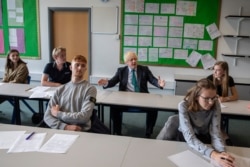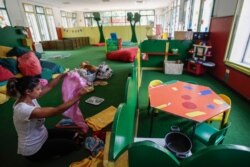European governments are preparing to reopen schools in coming days for the new academic year, as health experts say it’s vital for children to resume education. Most pupils have not attended school for six months, since lockdowns were imposed in March to contain the coronavirus pandemic.
However, some teaching unions have voiced concerns about the safety of staff as infection rates continue to rise.
British Prime Minister Boris Johnson visited a school in central England Wednesday, close to the city of Leicester where a recent outbreak of the coronavirus led to a re-imposition of lockdown measures. Johnson insisted that reopening schools must be a priority.
"Schools are safe, and it is fantastic seeing pupils coming back, see our kids coming back to school, and we want to see every single one coming back next week and in the succeeding days,” Johnson said.
The British government has threatened to fine parents who refuse to send their children back to school. In a policy reversal this week, high school pupils must now wear masks in communal areas.
“Face coverings [are needed] in those types of areas outside the classroom, but not in the classroom because that's clearly nonsensical, you can't teach with face coverings and you can't expect people to learn with face coverings,” Prime Minister Johnson said during a visit to a high school in the town of Coalville.
Britain’s chief medical officer, Chris Whitty, said in an interview this week that the balance of risk is overwhelmingly in favor of schools reopening.
“The chances of children catching COVID and then getting the long-term serious problems as a result of it—solely deemed due to going to school—are incredibly small,” Whitty told Reuters. “The evidence that not going to school damages children, in the long run, is overwhelming, and that includes their long-term chances. It increases the risks of disparities, increases, entrenches problems with deep-rooted problems that people may have. It increases the risk that they have mental and physical ill-health in the long run.”
In France, all adults and students at 6th grade and above will have to wear masks when schools reopen next month. Education Minister Jean-Michel Blanquer told reporters Wednesday he was confident that infection rates could be controlled.
“For this next start of the year we will be able to benefit from experience from May and June because the teachers, but also our children, have been able to practice some responses related to safety precautions,” Blanquer said.
Italy is basing its school reopening policy around widespread coronavirus testing for teachers and pupils. The deputy minister of health, Pierpaolo Sileri, said the government would take quick action in the event of an outbreak. “It is clear that in cases where you have a bigger cluster you will have to close down the school if necessary, or just the class, or the children will remain at home,” Sileri said this week.
Spain has recorded the highest number of weekly infections since the peak of the pandemic. However, deaths remain much lower and the government said it’s vital that schools reopen.
"The school year must begin normally,” Prime Minister Pedro Sanchez said Tuesday. “That is what the Spanish government wants and is working on it with the regional governments. It's the roadmap, there is no other. We owe it fundamentally to mothers, fathers, students, our sons and daughters, teachers and workers that it happens in a safe environment. Every autonomous region with the support of the Spanish government must guarantee it and we will guarantee it.”
Thousands of German students had to be quarantined around the country after classes resumed this earlier month, according to wire reports. But Germany is determined to keep schools open, so they're sending individual students into quarantine and organizing others into so-called cohorts that are granted their own school grounds, cloakrooms, restrooms and canteen.
Many European students will receive their first formal education in six months when schools reopen. Health experts say it’s vital to get children back in the classroom.
“Evidence does show that the transmission rates are actually higher amongst teachers,” Oksana Pyzik, a public health expert at University College London told VOA Thursday. “So we do need to think about how we can protect teachers as well as pupils because now we are entering a global educational crisis with over one billion children out of school.”
Summer holidays are nearly over. Across Europe there is nervousness as infection rates rise just as schools and many offices prepare to reopen.







